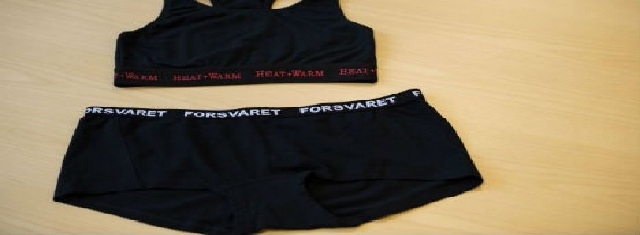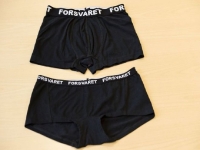Health
NORWAY ARMED FORCES GET ECO-FRIENDLY UNDERWEAR
NORWAY ARMY AMONG MOST PROGRESSIVE

(Source: Norwegian Armed Forces)
USPA NEWS -
Norway's army is among the world's most progressive introducing many changes along the time, and now, crossing a very important border that has nothing to do with battle tactics or campaigns. In the past, Norway showed the way by introducing...
Norway's army is among the world's most progressive army introducing many changes along the time, and now, crossing a very important border that has nothing to do with battle tactics or campaigns. In the past, Norway showed the way by introducing unisex dormitories, meatless Mondays and permits for male soldiers to sport pony-tails.
The VG Newspaper reported that the logistic division signed contracts with eco-clothings providers and that the personnel will be kitted out in organic cotton underpants and bras.
The VG Newspaper reported that the logistic division signed contracts with eco-clothings providers and that the personnel will be kitted out in organic cotton underpants and bras.
Using organic cotton is being an important issue in Norway. Fewer polluants enter the environment with the production of organic cotton, which is grown without the use of chemical pesticides, fungicides, herbicides, fertilizers or genetic engineering.
Comfort being everything, whether on the field of battle or relaxing. Substainable fashion is a sort of battle in its own way to save the Earth. The underwear will cost a bit more but according to a member of the armed forces' logistics division "we aren't talking about a lot more kroner per unit. We have done tests to show that this underwear is nice to wear and that is, of course, very important for soldiers in the field."
Comfort being everything, whether on the field of battle or relaxing. Substainable fashion is a sort of battle in its own way to save the Earth. The underwear will cost a bit more but according to a member of the armed forces' logistics division "we aren't talking about a lot more kroner per unit. We have done tests to show that this underwear is nice to wear and that is, of course, very important for soldiers in the field."
In 2013, the army was announcing that it will instore a new meatless Mondays to cut its consumption of ecologically unfriendly foods whose production contributes heavily to global warming. It was added that the experienced going on at one of Norway's main bases will be rolled out to all units, including those serving overseas, cutting down its meat consumption by 150 tonnes per year.
Still in 2013, the army announced that male soldiers will be permitted to sport ponytails and braids under new gender-neutral regulations. The new rules were following a complaint from a male officer that while female soldiers were allowed to keep their hair in a loose braid or ponytail, men with longer hair had to gather it into a knot or hair net.
Still in 2013, the army announced that male soldiers will be permitted to sport ponytails and braids under new gender-neutral regulations. The new rules were following a complaint from a male officer that while female soldiers were allowed to keep their hair in a loose braid or ponytail, men with longer hair had to gather it into a knot or hair net.
In 2014, the army stated starting making women soldiers share unisex dormitories with their male colleagues. Ulla-Britt Lilleaas and Dag Ellingsen wrote a report "The Army : the vanguard, rear guard and battlefield of equality" and women were reporting that sharing a room helped make them "one of the boys". The authors were comparing the unisex camp with another training centre for the Royal Norwegian Navy, where women and men have separate rooms. "It becomes us and them, boys and girls".
Ruby Bird Yasmina Beddou Oslo Underwear Army Norway Armed Forces Friendly Tactics Battle Campaigns Dormitories Unisex Soldiers Vg Newspaper Organic Cotton Underpants Bras Polluants Environment Production Chemical Pesticides Fungicide
Liability for this article lies with the author, who also holds the copyright. Editorial content from USPA may be quoted on other websites as long as the quote comprises no more than 5% of the entire text, is marked as such and the source is named (via hyperlink).






